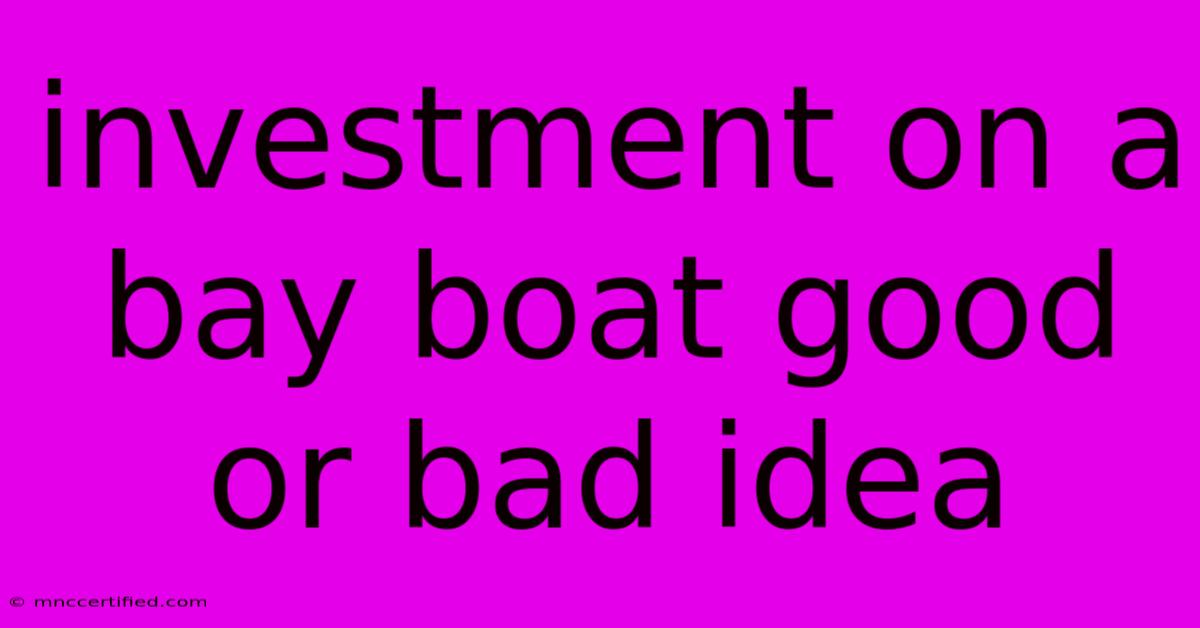Investment On A Bay Boat Good Or Bad Idea

Table of Contents
Is Investing in a Bay Boat a Good Idea? Weighing the Pros and Cons
The allure of a bay boat is undeniable: sleek design, versatile capabilities, and the promise of endless fun on the water. But before you take the plunge and invest in one, it's crucial to consider if a bay boat is a good fit for your needs and budget.
This comprehensive guide will break down the pros and cons of investing in a bay boat, helping you determine if it's the right boat for you.
The Appeal of Bay Boats: Why They're So Popular
Bay boats are a popular choice for a variety of reasons:
- Versatile Fishing Platform: Designed for shallow-water fishing, bay boats excel in navigating estuaries, inlets, and bays. Their shallow draft and wide beam offer stability and ease of movement in challenging waters.
- Comfortable Family Fun: Bay boats are known for their spacious decks and comfortable seating, making them perfect for family outings, entertaining friends, and enjoying leisurely cruises.
- Ease of Use: Typically powered by outboard motors, bay boats are relatively easy to operate and maintain, even for novice boaters.
- Excellent Value: Compared to larger center consoles or sportfishing boats, bay boats offer exceptional value, providing many of the same features at a more affordable price point.
The Pros of Owning a Bay Boat
- Fishing Excellence: The shallow draft and wide beam make bay boats ideal for fishing in a variety of conditions. Their ample deck space allows for plenty of casting room and fishing gear storage.
- Comfort and Space: Spacious seating, built-in coolers, and optional features like livewells and fish boxes make bay boats comfortable for long days on the water.
- Versatility: Beyond fishing, bay boats are perfect for cruising, tubing, water skiing, and even diving. Their versatility makes them suitable for a wide range of activities.
- Lower Maintenance Costs: Outboard motors are generally easier to maintain than inboard engines, and bay boats have simpler systems overall.
- Increased Property Value: In coastal areas, a bay boat can be a valuable asset, potentially adding to the overall value of your property.
The Cons of Owning a Bay Boat
- Limited Range and Speed: Bay boats are not designed for long-distance cruising or high-speed performance. Their shallow hull and relatively small size limit their range and top speed.
- Rough Water Handling: While stable in calm waters, bay boats can struggle in choppy seas. Their shallow draft and wide beam can make them susceptible to rolling and pitching.
- Limited Storage Space: Compared to larger boats, bay boats offer less storage space for gear and equipment.
- Potential for Depreciation: Like any used vehicle, bay boats depreciate over time. The rate of depreciation can vary based on the make, model, and overall condition.
- High Initial Costs: While more affordable than some other boat types, bay boats still require a significant initial investment, including the boat itself, motor, trailer, and accessories.
Making the Right Decision: Factors to Consider
- Your Budget: Determine how much you can afford to spend on the boat, including the initial purchase price, ongoing maintenance, and storage costs.
- Your Needs and Lifestyle: What will you primarily use the boat for? Fishing, cruising, or a combination of activities?
- Your Boating Experience: Are you a seasoned boater or a novice? Consider the complexity of operating and maintaining the boat.
- The Water You'll Be Boating On: Will you be fishing in shallow waters, open bays, or coastal areas? Consider the boat's capabilities and limitations.
- Maintenance and Storage Costs: Factor in the ongoing costs of maintenance, repairs, insurance, and storage.
Conclusion: Is a Bay Boat Right for You?
If you're looking for a versatile, comfortable, and affordable boat that excels in shallow waters, a bay boat might be a great option. However, it's crucial to consider the potential drawbacks, such as limited range, rough water handling, and potential depreciation.
Ultimately, the decision of whether or not to invest in a bay boat depends on your individual needs and preferences. By carefully weighing the pros and cons, you can make an informed decision that aligns with your boating goals and budget.

Thank you for visiting our website wich cover about Investment On A Bay Boat Good Or Bad Idea. We hope the information provided has been useful to you. Feel free to contact us if you have any questions or need further assistance. See you next time and dont miss to bookmark.
Featured Posts
-
Why Arsenal Fans Hope Odegaard Is The Answer
Nov 07, 2024
-
Dentist In Tijuana That Take Us Insurance
Nov 07, 2024
-
Should I Clean My Car Before Trading It In
Nov 07, 2024
-
Club Brugge 1 0 Aston Villa Inter 1 0
Nov 07, 2024
-
Trump Win Sparks Bitcoin Price Record High
Nov 07, 2024